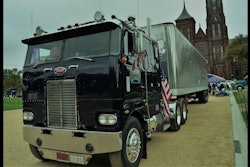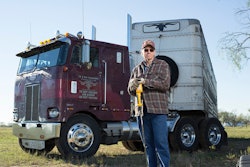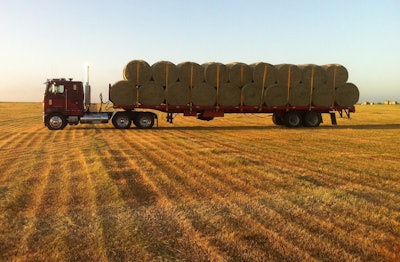
The rig shown above loaded with round bales in some kind of setting, I’ll say, came in from Texas-based independent Zach Beadle, whom longtime readers may remember from Overdrive issues of days and years gone by. In any case, Beadle wrote in with the following dispatch pursuant to some of our recent coverage of the problems many have been having with emissions systems in newer-model trucks.
You can find some of that coverage in links throughout this story. Beadle’s thoughts on his own 1976 Peterbilt power unit follow (more photos and more about his operation in the gallery at bottom):
I have friends who tell me quite often that I should never consider getting rid if my 1976 COE Peterbilt, which I’ve owned for 25, going on 26 years now, because I will regret doing so. So I ask them why they say that, and their reply is that I will always be in the shop. Their problems with their trucks they own is that they are constantly in the shop because of sensors and other software-related issues with the new-emissions truck.
These same guys are going broke because of the issues they are having with their trucks, and it’s because down here in South Texas the shops are so far behind they can’t get to their trucks and address the problems for at least two weeks. This isn’t just an over-the-road truck problem. Many of my farmer associates are having the same thing happen to them with their farming equipment.
It’s really strange to me to see all this new “cleaner” equipment that’s on the road today. I see many of them smoking more than my 70s technology Cummins Big Cam 1 400. I average 5.3 mpg pulling a (parachute, or at least that’s how it feels) cattle trailer and can get upwards of near 6 when I’m pulling my flatbed.
I hear many of these guys say that they are getting about 6 mpg, and some aren’t doing as well as I am, but if a truck is always broke down and it takes forever to get it fixed, I’ll stick with my old truck! –Zach Beadle, Devine, Texas
And what an old truck it is!
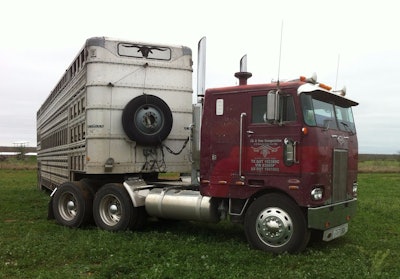 The 1976 Peterbilt was "three years old when I first drove it for the original owner," Beadle says. Then, "in 1989, I bought the truck from Rush Enterprises in San Antonio and the cattle trailer from the man who is the original owner of the truck. I started out hauling cattle exclusively."
The 1976 Peterbilt was "three years old when I first drove it for the original owner," Beadle says. Then, "in 1989, I bought the truck from Rush Enterprises in San Antonio and the cattle trailer from the man who is the original owner of the truck. I started out hauling cattle exclusively."
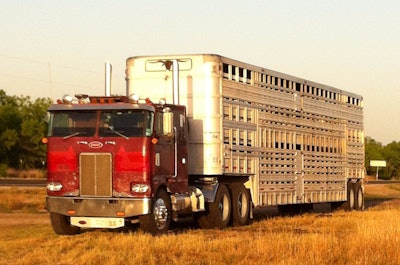 The cattle trailer is a 1977 Wilson Stocker Feeder.
The cattle trailer is a 1977 Wilson Stocker Feeder.
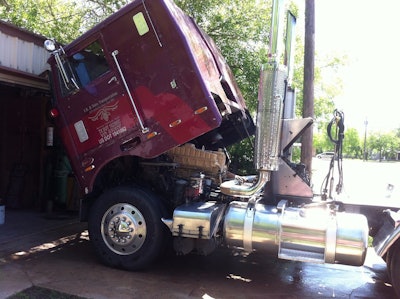 A view during some maintenance under way -- Beadle says he does most of his own work on the truck, greasing at least every two weeks in addition to inspecting daily. At once, "I hired a friend of mine who operates a mobile mechanic service to overhaul my engine this past April," says Beadle. "I test all oil samples. I change oil on my gears and transmission regularly, and I even service my 5th wheel every two weeks. My cab gets just as much attention as any running part of the truck."
A view during some maintenance under way -- Beadle says he does most of his own work on the truck, greasing at least every two weeks in addition to inspecting daily. At once, "I hired a friend of mine who operates a mobile mechanic service to overhaul my engine this past April," says Beadle. "I test all oil samples. I change oil on my gears and transmission regularly, and I even service my 5th wheel every two weeks. My cab gets just as much attention as any running part of the truck."
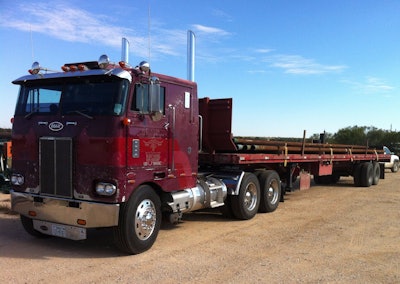 With a versatility enabled by ownership of several different trailer types, Beadle's intrastate Texas business runs freight for "half a dozen great clients," he says, "all of which are very easy to work with and the paycheck almost beats me to the house." The operator gets home every day, running mostly within a 300-mile radius.
With a versatility enabled by ownership of several different trailer types, Beadle's intrastate Texas business runs freight for "half a dozen great clients," he says, "all of which are very easy to work with and the paycheck almost beats me to the house." The operator gets home every day, running mostly within a 300-mile radius.
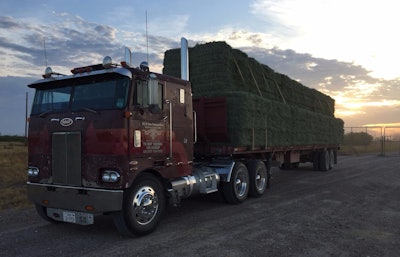 The Trailmobile flatbed in the pictures here is "two months older than my truck," says Beadle, "built in March of 1976." The truck was built in May the same year. In addition to the flat, Beadle adds he also uses dry van trailers for "a friend of mine hauling square-bale hay to feed stores in our area."
The Trailmobile flatbed in the pictures here is "two months older than my truck," says Beadle, "built in March of 1976." The truck was built in May the same year. In addition to the flat, Beadle adds he also uses dry van trailers for "a friend of mine hauling square-bale hay to feed stores in our area."
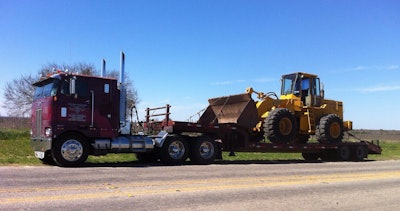 In addition to construction equipment, Beadle says he's run "flatbed doubles with hay and various oilfield loads and riggings as of late."
In addition to construction equipment, Beadle says he's run "flatbed doubles with hay and various oilfield loads and riggings as of late."
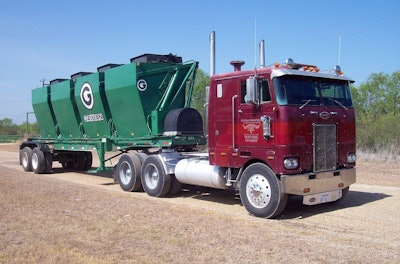 This setup, a Killebrew trailer for bulk fertilizer, is also among the configurations he's accustomed to.
This setup, a Killebrew trailer for bulk fertilizer, is also among the configurations he's accustomed to.
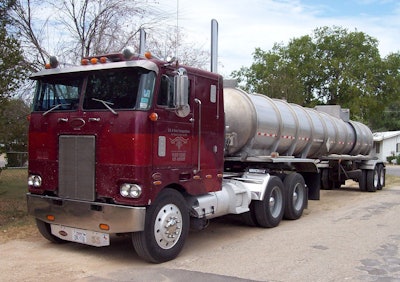 In addition to the Killebrew loads for "a feed store friend of mine," Beadle's run liquid bulk cattle feed in a "double conical tanker" like this one.
In addition to the Killebrew loads for "a feed store friend of mine," Beadle's run liquid bulk cattle feed in a "double conical tanker" like this one.



